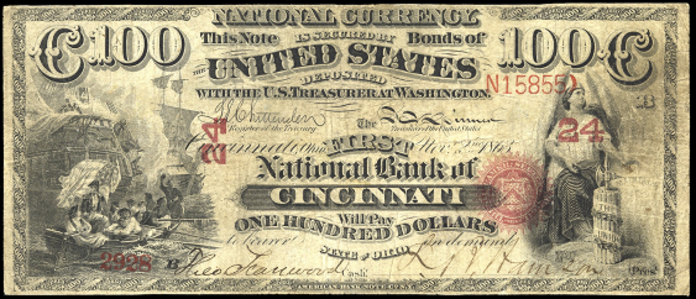One Hundred Dollar Notes › Nationals › 1863 One Hundred Dollar Original Series National Bank Notes › Pennsylvania Charters › 1863 $100 Schwenksville Pennsylvania National Bank Of Schwenksville
Get Value Now
| Item | Info |
|---|---|
| Series | 1863 |
| Charter | #2142 National Bank of Schwenksville of Schwenksville, Pennsylvania |
| Year Chartered | 1874, 83 Banks Chartered |
| City Info | Schwenksville is a borough in Montgomery County, Pennsylvania, United States. The population was 1,385 at the 2010 census. It is notable for being located near the site of the Philadelphia Folk Festival. The borough was founded in 1684, when the Lenni-Lenape Indians ceded to William Penn the land along the Perkiomen Creek; it was incorporated in 1903. The borough was named for George Schwenk, whose son, Jacob Schwenk, served in George Washington's army. Source: Wikipedia |
| Similar Cities | City name is unique, no others like it. |
| Seal Varieties | Red with rays |
| See Also | If your note doesn't match try: 1. 1863 $100 Compound Interest Treasury Note 2. 1864 $100 Compound Interest Treasury Note 3. 1863 $100 Gold Certificate 4. 1861 $100 Interest Bearing Note 5. 1863 $100 Interest Bearing Note 6. 1864 $100 Interest Bearing Note |
| Other Info | 1. Value depends on notes known for charter, condition and market demand. |
| Neat Fact | Plate letters A-C for $50 Notes, A for $100 Notes (Friedbergs, 20th Ed. P 99) |
No Obligations Offers and Appraisals
Please submit a good photo or scan. It will be identified and evaluated. Understand there may be subtle differences between the image you see above and your note. Signatures, design, markings and note condition will determine the offer price. Notes in Uncirculated or better condition receive the best offers.
Appraisals can be estimated for wholesale and retail prices. Wholesale is what dealers typically pay. Retail is what a collector might pay. Retail is slightly higher in most cases.
Please visit this page for USA Paper Money Reference. Do not treat this page as a reference guide, it is for appraisal and acquisition purposes only.
